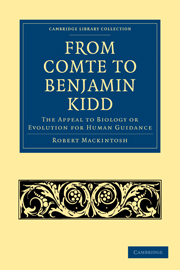Book contents
- Frontmatter
- PREFACE
- Contents
- CHAPTER I INTRODUCTORY
- PART I COMTISM, WITH SOME SCATTERED PARALLELS
- PART II SIMPLE EVOLUTIONISM—SPENCER, STEPHEN
- PART III DARWINISM, OR STRUGGLE FOR EXISTENCE
- CHAPTER XI “DARWINISM IN MORALS”—MISS COBBE'S PROTEST
- CHAPTER XII DARWINISM IN POLITICS—BAGEHOT
- CHAPTER XIII DARWINISM IN ETHICS—PROFESSOR ALEXANDER
- CHAPTER XIV REACTION FROM DARWINISM—HUXLEY
- CHAPTER XV REACTION FROM DARWINISM—DRUMMOND's “ASCENT OF MAN”
- CHAPTER XVI REITERATION OF DARWINISM: ELIMINATION MADE ABSOLUTE—MR. A. SUTHERLAND
- CHAPTER XVII THE METAPHYSICS OF NATURAL SELECTION
- PART IV HYPER-DARWINISM—WEISMANN, KIDD
- Index
CHAPTER XVI - REITERATION OF DARWINISM: ELIMINATION MADE ABSOLUTE—MR. A. SUTHERLAND
Published online by Cambridge University Press: 29 August 2010
- Frontmatter
- PREFACE
- Contents
- CHAPTER I INTRODUCTORY
- PART I COMTISM, WITH SOME SCATTERED PARALLELS
- PART II SIMPLE EVOLUTIONISM—SPENCER, STEPHEN
- PART III DARWINISM, OR STRUGGLE FOR EXISTENCE
- CHAPTER XI “DARWINISM IN MORALS”—MISS COBBE'S PROTEST
- CHAPTER XII DARWINISM IN POLITICS—BAGEHOT
- CHAPTER XIII DARWINISM IN ETHICS—PROFESSOR ALEXANDER
- CHAPTER XIV REACTION FROM DARWINISM—HUXLEY
- CHAPTER XV REACTION FROM DARWINISM—DRUMMOND's “ASCENT OF MAN”
- CHAPTER XVI REITERATION OF DARWINISM: ELIMINATION MADE ABSOLUTE—MR. A. SUTHERLAND
- CHAPTER XVII THE METAPHYSICS OF NATURAL SELECTION
- PART IV HYPER-DARWINISM—WEISMANN, KIDD
- Index
Summary
Mr. Sutherland's two handsome volumes are among the most recent, and certainly not the least important, contributions to the biological study of morals. They are interesting in many ways. As a gift from Australia to older lands they deserve a courteous welcome. As the outcome—so we learn from the preface—of eleven years of labour they deserve our respect and almost our reverence. They cover a very wide field, including biology, anthropology, history, philosophy. In the first Mr. Sutherland gives many results of his own observation, and so far as a non-expert can judge, he seems admirably equipped both as observer and as summariser for speaking on questions of biology. The same might be said regarding anthropology. In history Mr. Sutherland does not profess to be an original scholar, but he quotes to good purpose, and generalises strikingly. Yet why does a student of Robertson Smith express himself as if he had never heard of Old Testament criticism? Why should he speak as if the character or conduct of King Solomon threw any possible light upon the Book of Proverbs? No doubt the Old Testament references are of trifling amount; but when an author is dependent (necessarily) on a great amount of borrowed material, one cannot but judge of his quotations from regions beyond one's knowledge by what one sees of his procedure in regions where one is able, so far, to control his method and test his judgment.
- Type
- Chapter
- Information
- From Comte to Benjamin KiddThe Appeal to Biology or Evolution for Human Guidance, pp. 157 - 170Publisher: Cambridge University PressPrint publication year: 2009First published in: 1899

